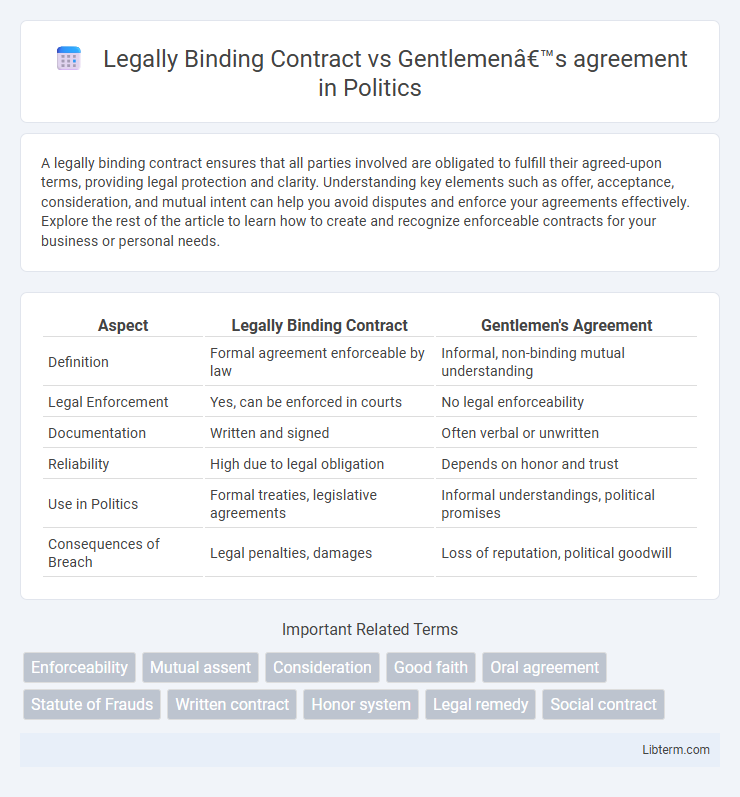A legally binding contract ensures that all parties involved are obligated to fulfill their agreed-upon terms, providing legal protection and clarity. Understanding key elements such as offer, acceptance, consideration, and mutual intent can help you avoid disputes and enforce your agreements effectively. Explore the rest of the article to learn how to create and recognize enforceable contracts for your business or personal needs.
Table of Comparison
| Aspect | Legally Binding Contract | Gentlemen's Agreement |
|---|---|---|
| Definition | Formal agreement enforceable by law | Informal, non-binding mutual understanding |
| Legal Enforcement | Yes, can be enforced in courts | No legal enforceability |
| Documentation | Written and signed | Often verbal or unwritten |
| Reliability | High due to legal obligation | Depends on honor and trust |
| Use in Politics | Formal treaties, legislative agreements | Informal understandings, political promises |
| Consequences of Breach | Legal penalties, damages | Loss of reputation, political goodwill |
Introduction to Legally Binding Contracts and Gentlemen’s Agreements
Legally binding contracts are formal agreements enforceable by law, requiring offer, acceptance, consideration, and mutual intent to create legal obligations. Gentlemen's agreements rely on trust and honor without legal enforceability, often used in informal or social contexts. Understanding the distinction is crucial for determining rights, obligations, and potential legal recourse in various agreements.
Defining Legally Binding Contracts
A legally binding contract is a formal agreement enforceable by law, requiring offer, acceptance, consideration, mutual intent, and clear terms to obligate parties to specific duties. Unlike a Gentlemen's agreement, which relies on trust and moral obligation without legal enforceability, a legally binding contract provides remedies through the judicial system for breaches or disputes. Such contracts are essential in business and legal transactions to ensure clear accountability and performance under defined conditions.
Understanding Gentlemen’s Agreements
Gentlemen's agreements are informal, unwritten arrangements based on trust and honor without legal enforceability. Unlike legally binding contracts that require explicit terms and formal signatures, gentlemen's agreements rely on the participants' integrity to uphold commitments. These agreements often involve personal or business relationships where flexibility and mutual respect are prioritized over legal obligations.
Key Differences Between the Two Agreements
Legally binding contracts enforce obligations through formal legal frameworks, requiring offer, acceptance, consideration, and mutual intent to create enforceable rights and duties, whereas gentlemen's agreements rely on trust and moral commitment without legal enforceability. Breach of a legally binding contract can lead to judicial remedies such as damages or specific performance, in contrast to gentlemen's agreements which lack legal consequences and depend solely on personal integrity. The formal documentation and adherence to statutory regulations distinguish binding contracts from the informal, non-legally recognized nature of gentlemen's agreements.
Legal Enforceability and Implications
A legally binding contract is enforceable by law, providing clear legal remedies and consequences if one party breaches the terms, whereas a gentlemen's agreement relies on trust without formal legal obligations, making enforcement difficult or impossible in a court of law. Legal enforceability of contracts involves documented terms, signatures, and consideration, ensuring protection and recourse for involved parties. In contrast, gentlemen's agreements lack these formalities, resulting in ambiguous implications and increased risk of disputes without legal resolution.
Benefits of Legally Binding Contracts
Legally binding contracts provide enforceable obligations that guarantee clarity and security for all parties involved, minimizing risks associated with misunderstandings or breaches. They offer formal documentation that can be presented in court to resolve disputes, ensuring accountability and legal protection. This legal certainty supports stronger business relationships and facilitates trust in high-stakes transactions.
Risks and Limitations of Gentlemen’s Agreements
Gentlemen's agreements lack the enforceability of legally binding contracts, presenting significant risks such as potential breaches without legal recourse or compensation. Parties relying on such informal agreements face uncertainties due to the absence of formal documentation, increasing disputes over terms and interpretations. This limitation often results in prolonged negotiations or losses, especially in high-value or complex transactions where clear, enforceable contracts are essential.
When to Choose Each Agreement Type
Opt for a legally binding contract when clear, enforceable terms and protection against breach are essential, especially in high-value or complex transactions. Gentlemen's agreements suit situations where trust and goodwill guide partnerships, often in informal or preliminary negotiations without the need for strict legal enforcement. Choosing between them depends on the level of risk, formality, and the necessity for legal recourse if terms are not honored.
Famous Examples in Business and Law
The difference between legally binding contracts and gentlemen's agreements is exemplified by landmark cases such as Carlill v. Carbolic Smoke Ball Co., where courts enforced explicit, written contracts based on offer and acceptance, versus the 1920s informal collaboration between Henry Ford and firemen that relied on mutual trust without legal enforcement. In business, the IBM and Microsoft partnership initially started as a gentlemen's agreement before evolving into detailed contracts that outlined responsibilities and intellectual property rights. Legal disputes, such as the Texaco and Pennzoil lawsuit, highlight the risks of relying purely on gentlemen's agreements, as the court upheld a binding contract over informal negotiations, demonstrating the necessity of clear, enforceable agreements in complex commercial transactions.
Conclusion: Making the Right Choice
Choosing between a legally binding contract and a gentlemen's agreement depends on the level of enforceability and formality required in a business or personal transaction. Legally binding contracts provide guaranteed legal protection through clear terms and formal documentation, ensuring accountability in case of disputes. Gentlemen's agreements, while based on trust and honor, lack legal enforceability and are best suited for informal or low-risk arrangements where mutual respect governs the relationship.
Legally Binding Contract Infographic

 libterm.com
libterm.com